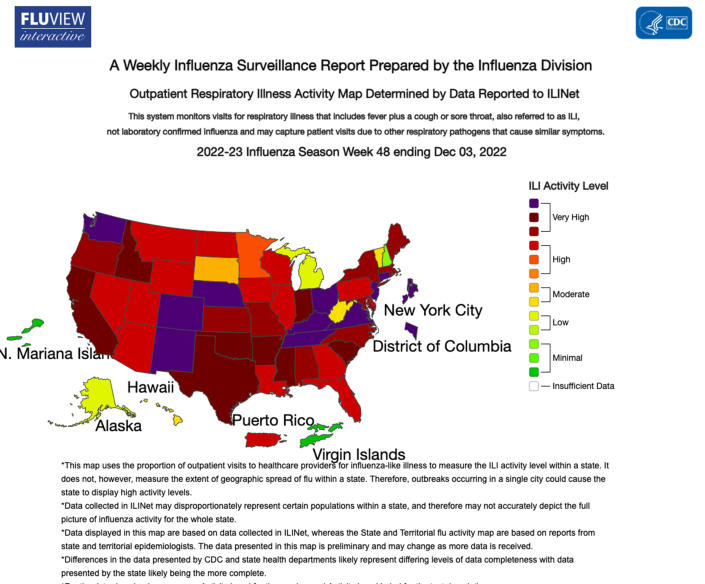With a triple incidence of flu, RSV, and COVID-19 in children and adults across the US, primary care physicians are on the front lines of all viral diseases.
Dr. Gary LeRoy, a family physician in Dayton, Ohio, and past president of the American Academy of Family Physicians calls it a “quadrimic” because it adds the common cold to the mix of illnesses now circulating.
“In my career, and I’m 30-something now, I’ve never seen a post-holiday outbreak like we’ve seen this year,” Leroy told TODAY.com.
“It seems like half of my patients that I see in one afternoon have upper respiratory tract infections, especially after a Thanksgiving trip… It’s not something that goes away quickly because we don’t even get to the hospital. Christmas”

Winter is typically cold and flu season. So how does a primary care doctor stay healthy this year surrounded by so many patients? LeRoy shares these tips, which can help anyone avoid getting sick now:
Stay up to date with vaccines
That’s “first and foremost” on Leroy’s checklist. After hearing warnings about a bad flu season in the Southern Hemisphere, he started getting his flu shot earlier than usual, which may predict what will happen in America.
He is on his fourth shot of Covid-19.
Continue to wear a mask and wash your hands
Leroy’s practice hasn’t stopped him from wanting a mask, so he wears one during office hours. When off-duty, the doctor decides to wear a mask in public indoor spaces on a case-by-case basis.
When people packed stores during Thanksgiving, for example, Leroy wore a mask. When there are few shoppers around, he doesn’t wear a mask but stays away from others. He consciously avoids crowds, going to the movies on vacation or grocery shopping at night when there are fewer people around.
“I’m still that guy who stands 6 feet away from the guy in front of me at the grocery store,” he says.
“And I’m a hand-washing fanatic – when I touch things that I know other people have touched, I start to clean or wash my hands.”
Focus on healthy eating
“Our immune system needs proper nutrition, hydration and sleep to build itself up to attack invading viruses,” Leroy says.
Instead of avoiding foods high in sugar, sodium, and carbohydrates, eat a balanced variety of fruits and vegetables, especially green leafy vegetables such as lettuce, kale, and spinach, which are rich in vitamins.
The doctor strongly believes in staying hydrated and drinking plenty of water throughout the day.
“I’m a diabetic, so it’s really important to stay hydrated to keep my blood sugar under control,” he said. If your diabetes is out of control, your immune system will not work properly.
Do not rely on vitamins or supplements
They’re not a substitute for eating a balanced diet, cautions Leroy. The body tries to get the nutrients it needs from food.
“Sometimes we take these megavitamins and they’re far from the recommended daily needs for adults, so we end up with very expensive urine and stool,” he said.
Do exercise every day
Leroy’s favorite thing to do is to walk and he makes it a habit to walk a mile or two at lunchtime which gets him 10,000 steps every day. He also wants to do 30 minutes of aerobic exercise every day—any activity that gets his heart rate up.
If you don’t move, it’s like having a car and sticking it in the garage for the winter – things don’t work well when the car is parked, he said.
“We are a cardiovascular entity,” says Leroy. “(The heart) is one way to make the oxygen and blood circulation in our body more efficient. Exercise works with our immune system to ensure that disease-fighting white blood cells get to where they need to go.”
After exercise, people feel more refreshed and rejuvenated because things are moving in the body, he added.
Seek fresh air and sunlight
LeRoy has a gym membership, but tries to get outside whenever the weather permits.
“I really enjoy going outside. Not only does it give you the fresh air you need, it also stimulates you emotionally and intellectually,” he said.
“When I go for a week or so without sunny days, you feel resentful of the lack of sunlight. When the sun rises, it’s best to go out and spend a lot of time.”
Get enough sleep
Leroy recommends seven to eight hours a night, leaning more toward eight, because it’s when we sleep that our bodies repair or rebuild our immune systems.
“Your immune system must have time to produce the necessary substances that fight diseases, bacteria and viruses, and it works when the body is not actively moving,” he said.
“We need to stop and shut down the engines so they can focus on building the molecular antibodies that protect our bodies.”
Do things that bring you joy
“One of the things that can make a person’s immune system worse is depression and anxiety and the kind of emotional depression that happens during these winter months with gray skies and cold,” says Leroy.
“We’re sitting around and we’re not eating right, we’re not sleeping right and we’re not finding joy in ourselves. So trying to do things that bring you joy (can help).
This article was originally published on TODAY.com.
[ad_2]
